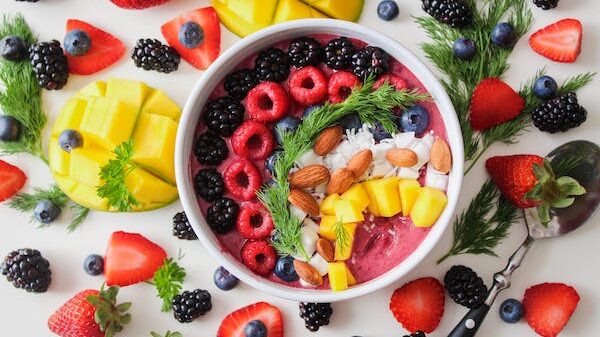Are you tired of feeling sluggish and low on energy? Do you struggle to stay focused throughout the day? It’s time to take a closer look at your eating habits. What we put into our bodies plays a significant role in how we feel, both physically and mentally. By adopting healthy eating habits, you can fuel your body for optimal performance and achieve lasting energy, concentration, and overall well-being. In this blog post, we’ll explore some simple tips for making healthier food choices that will help you perform at your best every day!
Introduction to Healthy Eating Habits
We all know that eating healthy is important, but with so many different diets and opinion out there, it can be hard to know where to start. Eating habits are unique to each individual, so there is no one-size-fits-all approach to healthy eating. However, there are some general principles that can help you create healthier eating habits that work for you.
The first step is to focus on making more nutrient-dense choices. This means choosing foods that are packed with vitamins, minerals, and other nutrients that your body needs to function optimally. nutrient-rich foods include fruits, vegetables, whole grains, lean protein sources, and healthy fats.
Another important part of creating healthy eating habits is learning how to portion your food correctly. Overeating can lead to weight gain and other health problems, so it’s important to make sure you’re not consuming more calories than your body needs. A good rule of thumb is to fill half of your plate with fruits and vegetables, a quarter with lean protein, and a quarter with whole grains or another complex carbohydrate.
You should also make sure to drink plenty of water throughout the day.Water helps flush toxins from your system and keep your body hydrated and functioning properly. aim for eight glasses of water per day, or more if you exercise regularly or are exposed to hot weather or dry conditions.
Don’t forget about the importance of maintaining a balanced diet.
Benefits of Eating Healthy
When it comes to optimal performance, what you put into your body definitely matters. Eating healthy foods helps ensure that your body has the nutrients it needs to function properly. This in turn can help improve things like energy levels, focus, and recovery time.
Of course, eating healthy also comes with a host of other benefits. For instance, it can help reduce your risk for developing chronic diseases like heart disease, obesity, and type 2 diabetes. It can also help improve your mental health and mood.
So if you’re looking to perform your best, both physically and mentally, be sure to fuel your body with healthy foods!
Developing Healthy Eating Habits
When it comes to developing healthy eating habits, the most important thing is to focus on fueling your body with nutrients that will help you perform at your best. This means eating plenty of fruits, vegetables, whole grains, and lean protein. It also means limiting your intake of processed foods, sugary drinks, and unhealthy fats.
Making these changes can be tough, but there are a few simple strategies that can help you make the transition to a healthier diet:
1. Plan ahead: Planning your meals and snacks in advance can help you make healthier choices when you’re on the go.
2. Keep it simple: Don’t try to overhaul your diet all at once. Start by making small changes, like swapping sugary drinks for water or adding an extra serving of vegetables to your meals.
3. Find what works for you: There’s no one-size-fits-all approach to healthy eating. Experiment with different foods and recipes to find what you enjoy and what makes you feel your best.
4. Seek support: If you’re having trouble making changes to your diet on your own, talk to a registered dietitian or other health professional for guidance and support.
What to Eat for Optimal Performance
Assuming you are talking about athletes, there are a few key things they should be eating for optimal performance.
1. Carbohydrates: Carbs are essential for providing energy to the body. When athletes are training or competing, their bodies use up glycogen (the stored form of carbs) at a faster rate. It’s important to replenish glycogen stores by eating carbs before, during, and after exercise.
2. Protein: Protein is important for rebuilding and repairing muscles. It’s especially important for athletes because they tend to have higher muscle mass than sedentary people and they’re constantly breaking down muscles during training. Eating protein can help athletes recover from workouts and prevent injuries.
3. Fat: Fat is an important source of energy for athletes. It’s also necessary for proper hormone production and joint lubrication. However, fat intake should be limited because too much fat can lead to weight gain.
4. vitamins and minerals: Vitamins and minerals are essential nutrients that the body needs to function properly. They’re important for everything from immunity to bone health. Athletes need to make sure they’re getting enough vitamins and minerals through their diet or supplements to support their training demands.
Tips for Sticking to a Healthy Diet
When it comes to eating healthy, it’s important to find what works for you and your lifestyle. There is no “one size fits all” approach to healthy eating, so it’s important to find what works best for you. Here are some tips to help you stick to a healthy diet:
1. Find what works for you: As mentioned above, there is no “one size fits all” approach to healthy eating. What works for one person may not work for another. Find an approach that feels sustainable for you and that you can stick with long-term.
2. Make healthy food choices: When it comes to choosing what foods to eat, opt for nutrient-rich options that will give your body the fuel it needs to perform at its best. Choose whole foods over processed foods, and make sure to include plenty of fruits, vegetables, and lean protein in your diet.
3. Don’t deprive yourself: Depriving yourself of the foods you love will only make it harder to stick to a healthy diet in the long run. Allow yourself occasional treats in moderation – just be sure they fit into your overall healthy eating plan.
4. Be prepared: Having healthy snacks and meals on hand can help you stay on track when hunger strikes. Planning ahead and being prepared with healthy options will help you resist temptation when unhealthy choices are available.
5. Stay motivated: Remind yourself why you
Recipes for Healthier Meals
If you’re looking to improve your diet and make healthier meals, there are plenty of delicious recipes that can help. Here are some ideas to get you started:
1. Make a big batch of roasted vegetables at the beginning of the week. Roasting brings out the natural sweetness of veggies, and they’re great as a side dish or added to salads and grain bowls.
2. Whip up a simple frittata using eggs, veggies, and some shredded cheese. This makes a great light lunch or dinner, and can be easily customized with whatever ingredients you have on hand.
3. Soup is always a good option when you’re looking for something healthy and filling. Try making a veggie-packed minestrone or a hearty lentil soup.
4. When it comes to grains, quinoa is a great option as it’s packed with protein and fiber. Cook up a batch at the beginning of the week and use it in salads, bowls, or as a side dish throughout the week.
5. Greek yogurt is a great way to add some extra protein to your diet. Top it with fruit or granola for breakfast or use it in place of sour cream in dips and sauces.
Nutritional Supplements for Optimal Performance
Nutritional supplements can play an important role in optimizing performance, whether you are a professional athlete or simply aiming to improve your fitness. In addition to a healthy diet, supplements can help you reach your goals by providing the nutrients your body needs to perform at its best.
There are many different types of supplements available, and it is important to choose those that are right for you and your specific goals. For example, if you are looking to increase muscle mass, you may want to consider taking a protein supplement. If you are seeking to improve your endurance, you may want to take an energy supplement. And if you are hoping to speed up your recovery time after workouts, you may want to take a vitamin or mineral supplement.
No matter what your goals may be, there are nutritional supplements that can help you achieve them. Be sure to talk with your doctor or a registered dietitian before starting any supplement regimen, as they can help you select the right products for your needs and make sure that they do not interfere with any medications or other treatments you may be taking.
Conclusion
Eating healthy is essential to living a long and active life. By following the tips discussed in this article, you can create better eating habits that will help fuel your body for optimal performance. Not only will these habits improve your overall health and well-being, but they will also help you avoid potential health problems in the future. With proper nutrition and regular exercise, you can reach all of your fitness goals!










